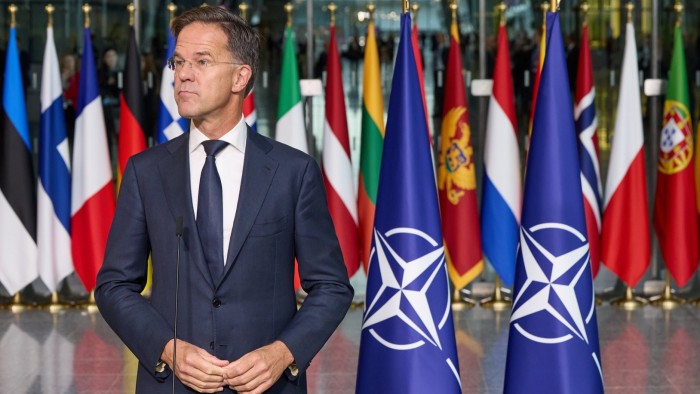Unlock the White House Watch newsletter for free
Your guide to what the 2024 US election means for Washington and the world
Nato’s new secretary-general has warned Donald Trump that the US would face a “dire threat” from China, Iran and North Korea if Ukraine is pushed to sign a peace deal on terms that are favourable to Moscow.
In an interview with the Financial Times, Mark Rutte said deepening ties between US adversaries endangered America as he made a pitch to the president-elect to stick with Nato and continue to support Ukraine.
Rutte noted the risks from Russia supplying missile technology to North Korea and cash to Iran. In an apparent reference to Taiwan, he said that Chinese President Xi Jinping “might get thoughts about something else in the future if there is not a good deal [for Ukraine]”.
“We cannot have a situation where we have [North Korean leader] Kim Jong Un and the Russian leader and Xi Jinping and Iran high-fiving because we came to a deal which is not good for Ukraine, because long-term that will be a dire security threat not only to Europe but also to the US,” Rutte told the FT in his first interview as head of the western military alliance.
Rutte said he had made this point to Trump at their meeting in Florida on November 22, as part of an effort to persuade the US president-elect to remain engaged with western allies and continue American support for Ukraine.
“Look at the missile technology which is now being sent from Russia into North Korea, which is posing a dire threat not only to South Korea, Japan, but also to the US mainland,” Rutte said he told Trump.
“Iran is getting money from Russia in return for, for example, missiles, but also drone technology. And the money is being used to prop up Hizbollah and Hamas, but also steering conflict beyond the region,” he said.
“So the fact that Iran, North Korea, China and Russia are working so closely together . . . [means] these various parts of the world where conflict is, and have to be managed by politicians, are more and more getting connected,” Rutte said.
“And there is one Xi Jinping watching very carefully what comes out of this,” he added, in an apparent reference to fears that if Russia is allowed to seize large parts of Ukraine, Xi may feel emboldened to use force against Taiwan. “These were the points I made.”

During his campaign for president Trump vowed to end the war in Ukraine in “24 hours”. He has selected former general Keith Kellogg as his special envoy for Ukraine and Russia, who has called for freezing the existing battle lines and forcing Kyiv and Moscow to the negotiating table.
Rutte took office in October with a strong record of working successfully with Trump during his first presidency. The former Dutch prime minister was integral to a 2018 push for Nato allies to spend more on defence in order to head off a threat by Trump to withdraw US support for the alliance.
“We have a strong relationship. We liked each other when I was in my previous role when he was president. And I sense that we can work from the same basis. And it helps that you find it’s genuinely a pleasure to work together.”
Rutte will chair a meeting of Nato foreign ministers in Brussels on Tuesday where Ukraine’s top diplomat has called for the country to be given a formal invitation to join the alliance, something that the US and Germany, in particular, have ruled out in the near future.
The secretary-general said that increasing military support to Ukrainian President Volodymyr Zelenskyy ahead of any potential peace talks was more important than debating when membership could be offered.
“The most important thing now is to make sure that whenever Zelenskyy decides to get into peace talks, that he can do this from a position of strength,” Rutte said. “That for me is now priority number one.”
He said that the sequencing of peace talks and a Nato membership invitation “is something allies are clearly consulting each other about; what could be the best next step and how to work on this”.
“But what I always say to them when they ask me: I say, well, that’s all very fine and we need to have these debates, but for the immediate future, the most important thing is to get your military aid into Ukraine, particularly air defence, but also the offensive systems they need to fight a war,” he added.
Read the full article here




